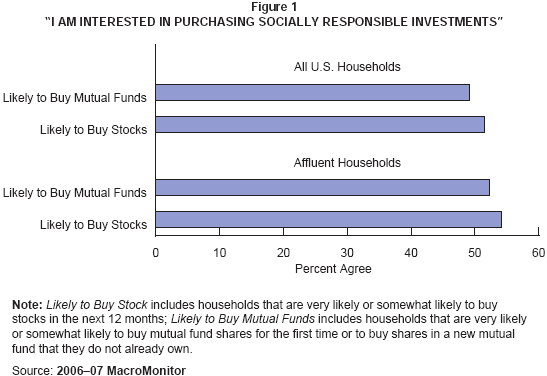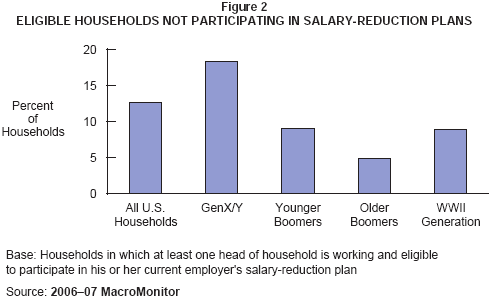MacroMonitor Market Trends April 2008
MacroMonitor Market Trends highlights topical news and trends of interest to you and your colleagues. If you would like more information about the items in the newsletter or would like to discuss other ways that we can assist you in your research and marketing efforts, please contact us.
In this issue:
The 2008–09 MacroMonitor questionnaire goes to the field this month. This newsletter highlights three new questions in the survey that measure specific emerging trends in consumer financial behaviors:
Green Investing: Are Investors Putting Their Money Where Their Mouths Are?
Tuesday, 22 April 2008, marks the thirty-eighth anniversary of the first Earth Day celebration in 1970. Now, several decades later, financial institutions (and other major corporations) are beginning to take serious note of the impact of the environmental movement on their businesses. Now that "being green" has taken a strong hold on the consumer psyche, more financial institutions are launching products that enable consumers to invest in eco-friendly companies directly or through mutual funds.
We introduced the first environment attitudinal statement "I am interested in purchasing socially responsible investments" in the 2006 MacroMonitor survey. Responses to this statement revealed significant interest among potential investors in purchasing socially responsible investments. Among U.S. households that are likely to buy stocks in the next 12 months, 54% expressed agreement with this statement. And among households that are likely to buy mutual funds for the first time or buy new mutual funds that they do not already own, 52% expressed interest in purchasing socially responsible investments. And interestingly, Affluent households are almost as interested in being green as are households overall, with at least half of Affluent potential investors in stocks and mutual funds expressing interest in purchasing socially responsible investments.

To obtain a further understanding of the environmental movement's impact on households' financial behavior, the MacroMonitor has added two new statements to the 2008 survey that will measure households' green attitudes:
- I would be willing to make less money in order to invest in companies that are socially responsible.
- My household prefers to invest in companies that have a sound record of protecting the environment.
Subscribers to the MacroMonitor can thus look forward to more solid data to rationalize or support their strategic decisions related to offering "green" investment products and services.
Will Nontraditional Lending Sources Fill the Credit Void?
Microlending may be the next "in" activity for U.S. consumers. With traditional banks imposing tighter lending standards for mortgages, home equity lines of credit, and credit cards, access to credit is dwindling for many U.S. households and small-business owners. Alternative sources of credit may fill this void. The July 2007 issue of this newsletter noted the increasing popularity of online lending networks such as Prosper.Com and Zopa. We now see that Grameen Bank—a microlending organization notable for using microloans to help alleviate poverty in developing nations—has entered the U.S. market with Grameen America and is starting to disburse loans in New York (as the Washington Post, 10 March 2008, and other news sources report).
The 2008–09 MacroMonitor will begin tracking microfinancing/social-lending developments with our new questions that ask respondents about their awareness of peer-to-peer lending and whether they have used this type of credit (either as a borrower or as a lender) in the past or if they will use it in the near future. Obtaining a quantifiable measurement of this practice in lending is important for financial institutions to gauge implications of these emerging nontraditional sources of consumer credit on the industry.
How Successful Is Automatic 401(k) Enrollment?
The Pension Protection Act of 2006 brought sweeping changes to U.S. pension laws, including legislation encouraging automatic enrollment in 401(k) plans. The MacroMonitor will capture the following data about this new legislation with the fielding of our 2008 survey:
- Whether the current employer of either adult head of household automatically enrolls employees in its 401(k) salary-reduction plan
- If either adult head of household is enrolled in a 401(k) plan, whether he or she was automatically enrolled and did not decline to participate or voluntarily enrolled before the enactment of the legislation
- If either adult head of household was automatically enrolled and did not opt out, what investment choices he or she made at the time of enrollment:
- Accepted the default investment choice
- Made an investment choice other than the default
- Accepted the default contribution amount
- Selected a contribution amount other than the default.
Despite consumer concerns about the adequacy of their retirement savings, the 2006–07 MacroMonitor data show that a significant proportion of workers eligible to participate in salary-reductions plans do not do so. For example, heads of household in nearly 13% of all U.S. households do not have a salary-reduction plan, even though at least one household head is eligible to participate in his or her current employer's salary-reduction plan. Among GenX/Y households with at least one head of household eligible to participate in such a plan, nearly one in five households choose not to do so. The 2008–09 MacroMonitor data could shed light on whether the new law has been at all successful in bolstering the rate of salary-reduction–plan participation and on which household segments have been proactive in their investment choices after automatic enrollment.
